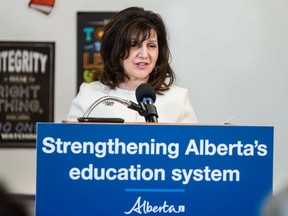Opinion: Alberta's draft social studies curriculum will hinder students

Article content
As social studies professors from all 10 of Alberta’s faculties of education, we have grave concerns about the draft K-6 social studies curriculum recently released by Education Minister Adriana LaGrange.
It rests on shaky foundations
The proposed curriculum is grounded in a flawed assumption that before students can engage in critical and creative thinking, they must first accrue a massive body of knowledge. Knowledge is, of course, important. However, learning hundreds of discrete facts disconnected from larger ideas makes it extremely difficult for students to make meaningful connections to their own lives and to broader understandings of concepts such as democracy, human rights, and social cohesion — ideas that help us live well together.
Research in Canada and internationally has demonstrated that classrooms where students are encouraged to develop and express their views, examine issues from multiple perspectives, and engage with complex social concerns are a strong predictor for young people’s knowledge of and engagement in civic society. The unwieldy content included in the draft curriculum makes such an approach to teaching and learning almost impossible. Forced to memorize and regurgitate an endless parade of facts, students will quickly learn to hate social studies.
It is developmentally inappropriate
The proposed curriculum does not take children’s cognitive or academic development into consideration. For example, in Grade 1 most six-year-olds don’t yet fully grasp how ideas like neighbourhood and city are different, yet they are expected to understand global migration. Children who are just starting to learn how to write words like “dog” and “cat” are somehow expected to understand the history of writing as a form of communication. In Grade 2, students are expected to understand the contributions of Ancient Greece to democracy, know the origin and expansion of the Silk Road, and identify how “our culture” continues to be influenced by Judaism, Christianity, and Islam. We could go on.
Decades of research in social studies education confirms that in the elementary years, the curriculum should focus on cultural universals — those aspects of our lives that most societies have in common, such as housing, education, celebrations, occupations, government and decision-making, and so on. The draft curriculum does not reflect any of this research. Frankly, it seems to have been written without any consideration of the children or subject that are supposed to be its focus.
It narrows the story of Alberta and Canada
The field of social studies education has its own history, one that includes struggles to expand who is included in the stories that we tell about ourselves and our relationships with others. The proposed curriculum, the likes of which has not been seen in Alberta since the 1950s, offers a story of Alberta and Canada that is deeply flawed, one-sided, and at times grossly inaccurate. It tells a triumphant story of European colonialism while minimizing how these exploits did, and continue to do, violence to so many. It is profoundly alienating and harmful to Indigenous, Black, LGBTQ+ and other marginalized peoples, whose histories have for too long been omitted, co-opted, or misrepresented.
When the curriculum does address issues of Canada’s painful past –– the enslavement of African peoples, residential schools, the KKK –– these legacies are treated as if they have no ties to the present. The curriculum writers shirk the responsibility all Canadians bear to redress these painful legacies of oppression by pointing to the United States, as though the long shadow of their sins will hide our own. Implicit in this narrow approach to history education is that the legacies of these historical events do not impact us today.
Education is about preparing students for the future we all need and hope to achieve. This future can only be developed through a curriculum that reflects the knowledge, skills and values associated with an evolving society and economy. Alberta has maintained its advantage by being a global leader in education in general, and social studies in particular. This will no longer be the case if the draft curriculum is implemented. It will slam the brakes on the creativity and potential that Alberta’s students need to meet a future that is largely unknown.
Cory Wright-Maley (St. Mary’s University), Carla Peck (University of Alberta), David Scott (University of Calgary), and Amy von Heyking (University of Lethbridge) on behalf of social studies professors from across Alberta.
Complete list of other authors:
Isaac Darko, Burman University
Kent den Heyer, University of Alberta
Craig Harding, Ambrose University
Carol Léonard, Campus Saint-Jean
Glory Ovie, The King’s University
Margie Patrick, The King’s University
Muna Saleh, Concordia University of Edmonton
Tanya Stogre, Mount Royal University
Aaron Stout, University of Lethbridge
Cathryn van Kessel, University of Alberta






Postmedia is committed to maintaining a lively but civil forum for discussion. Please keep comments relevant and respectful. Comments may take up to an hour to appear on the site. You will receive an email if there is a reply to your comment, an update to a thread you follow or if a user you follow comments. Visit our Community Guidelines for more information.